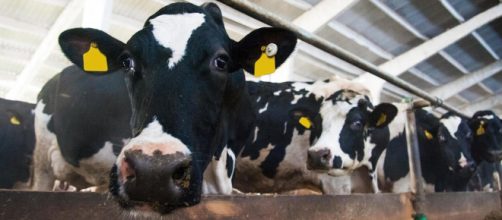The Scottish government has been forced to restrict movement around a farm in Aberdeenshire after it was confirmed that the herd had a case of bovine spongiform encephalopathy (BSE) - or mad cow disease.
The Rural Economy Secretary Fergus Ewing said the lockdown was standard practice when a case was identified, but added that the BSE is not known to have entered the human food chain.
BSE: Inspections underway
Ian McWatt - director of operations at Food Standards Scotland - assured the public that inspections were being carried out at every abattoir in Scotland to ensure public safety.
The case - the first in Scotland for ten years - was discovered when an animal died at an unnamed farm.
Investigations are underway to determine where the case could have come from. Chief Veterinary Officer Sheila Voss said her office was working closely with the Animal and Plant Health Agency to discover the source of the disease, but that it is too early to know yet.
She urged any farmer with concerns about the disease to contact a vet.
BSE: Sensations of pain
The disease causes a degeneration of the brain and spinal chord which causes cows to become confused and unable to stand. When transmitted to human beings it is known as Variant Creutzfeldt–Jakob disease and has symptoms including behavioural changes, psychiatric problems and sensations of pain.
The disease is fatal in humans, with an average life expectancy of just 13 months after the onset of symptoms.
An eradication program was introduced in the UK from 1983 until 2001, in which more than 180,000 cattle were identified as infected and an astounding 4.4 million were slaughtered. The disease had killed 170 people in the UK by 2014.
BSE: Transmitted through meat and bonemeal
An inquiry into BSE by the Irish and UK governments concluded that the cause was cattle - who are normally herbivores - being fed meat and bone meal (MBM) made from the remains of other cattle. The MBM was used as a high protein supplement. They found that cattle who had received the MBM were more likely to contract BSE.
Scotland was granted a "BSE negligible risk status" status 18 months ago - as they had no reports of the disease for more than 10 years - but now must return to the same status as the rest of the UK.
The last known case of BSE in the UK was in 2015 in Carmarthenshire, Wales. Before that British farming officials confirmed one case in 2014 and three in 2013.
The disease is one reason many people prefer alternative farming methods or to follow a vegan diet.


